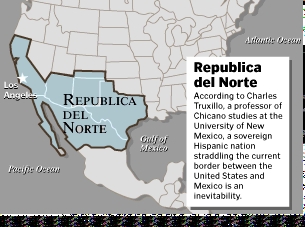Professor Predicts 'Hispanic Homeland'
By The Associated Press
http://www.atlantalatino.com/detail.php?id=2478

ALBUQUERQUE, N.M. — A University of New Mexico Chicano Studies professor
predicts a new, sovereign Hispanic nation within the century, taking
in the Southwest and several northern states of Mexico.
Charles Truxillo suggests the “Republica del Norte,” the Republic
of the North, is “an inevitability.”
He envisions it encompassing all of California, Arizona, New Mexico,
Texas and southern Colorado, plus the northern tier of Mexican states:
Baja California, Sonora, Chihuahua, Coahuila, Nuevo León and
Tamaulipas.
Along both sides of the U.S.-Mexico border “there is a growing fusion,
a reviving of connections,” Truxillo said. “Southwest Chicanos and
Norteño Mexicanos are becoming one people again.”
Truxillo, 47, has said the new country should be brought into being
“by any means necessary,” but recently said it was unlikely to be
formed by civil war. Instead, its creation will be accomplished by
the electoral pressure of the future majority Hispanic population
in the region, he said.
Other UNM professors were skeptical
Felipe Gonzáles, director of UNM's Southwest Hispanic Research
Institute, said there's a “certain homeland undercurrent” among New
Mexico Hispanics who believe land was stolen and promises broken.
But, he said, a new nation would need much more widespread support.
“Educated elites are going to have to pick up on this idea and run
with it and use it as a point of confrontation if it is to succeed,”
Gonzáles said.
Truxillo contends states have the right to secede under the Articles
of Confederation of 1777, in which states retained “sovereignty, freedom
and independence.” He contends the Articles were not superseded in
that regard by the U.S. Constitution and that although the Civil War
settled the question militarily, it was never resolved by courts.
History Professor Daniel Feller disagreed
“The Constitution does supersede the Articles of Confederation,”
Feller said. “It takes no notice of the articles and is not presented
as bearing any relation to them. The Constitution does not declare,
recognize or in any way acknowledge the right to secede.”
And, he noted, the full title was “Articles of Confederation and
Perpetual Union.”
The U.S. Supreme Court said in 1869 the union was indestructible,
political science Professor Joseph Stewart said.
He also said he was “somewhat skeptical in the sense of minority
politics” about a possible Republic of the North. He said Americans
of Mexican descent have moved all over the United States and that
“I don't see that Hispanic population becoming more distinct but in
fact becoming less distinct.”
Juan José Peña, Hispanic activist and vice chairman
of the Hispanic Roundtable, said there's not enough political consciousness
among Mexican Americans to form a separate nation.
“Right now, there's no movement capable of undertaking it,” he said.
Truxillo, who teaches at UNM's Chicano Studies Program on a yearly
contract, believes it's his job to help develop a “cadre of intellectuals”
to think about how it can become a reality.
Native-born American Hispanics feel like strangers in their own land,
he said
“We remain subordinated,” he said. “We have a negative image of our
own culture, created by the media. Self-loathing is a terrible form
of oppression. The long history of oppression and subordination has
to end.”
Truxillo said Hispanics who have achieved positions of power or otherwise
are “enjoying the benefits of assimilation” are most likely to oppose
a new nation.
“There will be the negative reaction, the tortured response of someone
who thinks, 'Give me a break. I just want to go to Wal-Mart.' But
the idea will seep into their consciousness, and cause an internal
crisis, a pain of conscience, an internal dialogue as they ask themselves:
'Who am I in this system?”'
© 2000 The Associated Press. All rights reserved.
--------------------------------------------------------------------------------
Dr. Charles Truxillo is a native of New Mexico. He attended public
schools in Albuquerque and Belen. Dr. Truxillo received his graduate
and undergraduate degrees from the University of New Mexico, majoring
in Latin American, Borderlands, and Asian History. Dr. Truxillo also
attended St. Michael's Catholic seminary in California. Later, he
worked as an instructor in the University College of UNM, serving
as director of the University College's Social Science program from
1988 to 1990. Throughout this period Dr. Truxillo traveled extensively
in Mexico, Central America, Spain, and Western Europe. Between 1992
and 1997, he was an Assistant Professor of History at New Mexico Highlands
University. While at NMHI, he annually organized student tours to
Mexico and sponsored student and faculty forums and symposiums.
